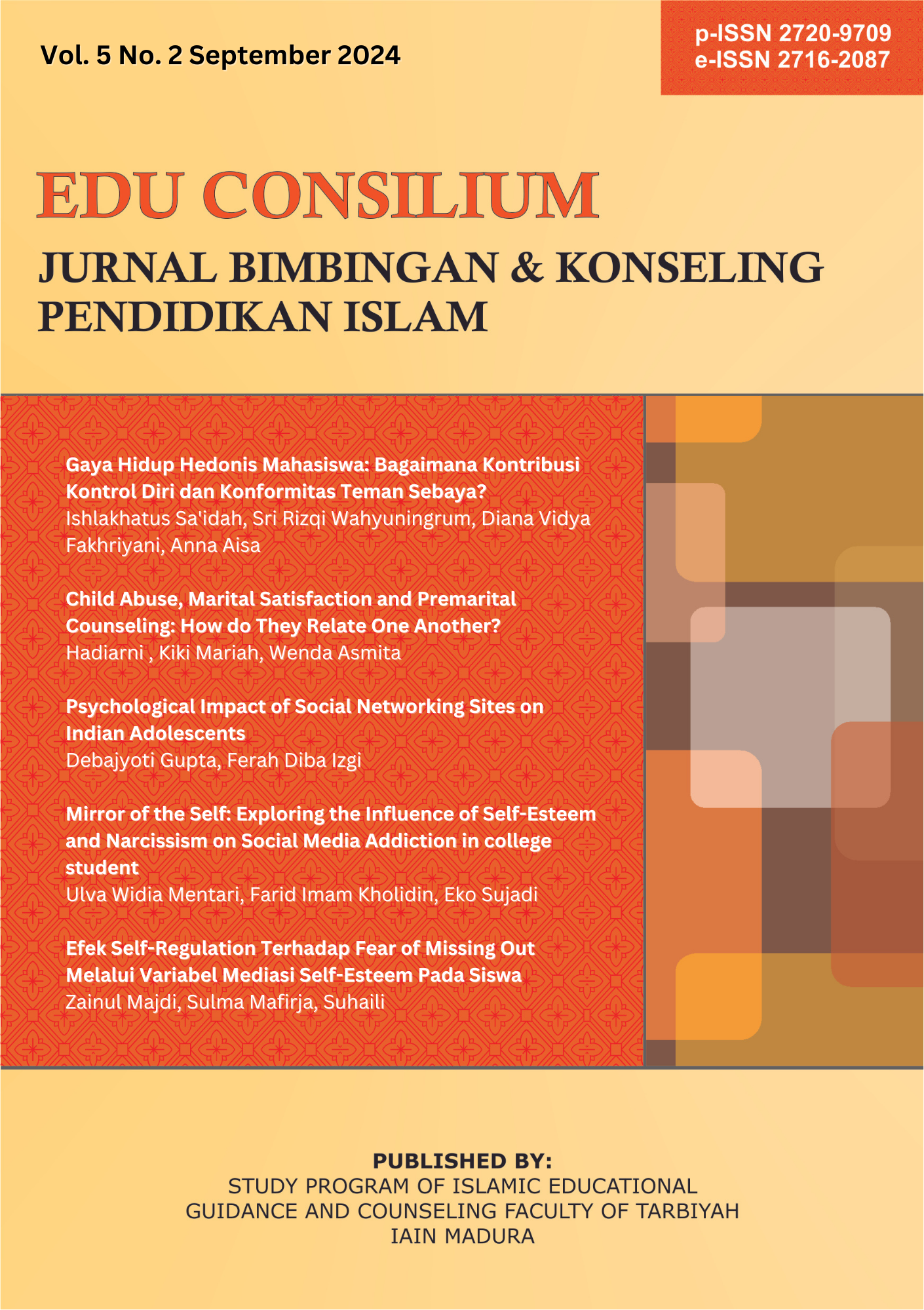Evaluation and Supervision of Tutoring Services at Junior High School 7 Malang
 Abstract views: 157
,
Abstract views: 157
,
 PDF downloads: 105
PDF downloads: 105
Abstract
Evaluation of the tutoring program is an important part of assessing the extent to which the tutoring program that the BK SMPN 7 Malang teacher provides to students has been implemented. This evaluation aims to determine the suitability of the tutoring program that has been carried out by guidance and counseling teachers at SMPN 7 Malang based on the six standards and criteria for professional counselors set by the Indonesian Guidance and Counseling Association (ABKIN) as an adaptation of the program evaluation set by the South Carolina Guidance and Counseling Program Model. This research uses quantitative methods. The technique used in collecting data uses instruments, which in this research were carried out and shared directly in the form of a Google Form. The instrument used in collecting research data is a tutoring evaluation instrument that has already been used with adjustments made by the current evaluator in an effort to achieve a better tutoring evaluation instrument. The results of the evaluation of basic tutoring services have been implemented fully and entirely, with a percentage of 86.26%.
Downloads
References
Agustiana, V. (2018). Layanan Bimbingan Belajar dengan Audio Visual Terhadap Perkembangan Bahasa Anak Usia Dini di PAUD Al Rizky Ban. Universitas Islam Negeri Raden Intan Lampung.
Ahmadi, A., & Supriyono, W. (2004). Psikologi Belajar (2nd ed.). Rineka Cipta.
Aisyah, S. (2022). e-ISSN: 2807-8632 Published by: Fakultas Tarbiyah dan Ilmu Keguruan (FTIK) Institut Agama Islam Negeri (IAIN) Palangka Raya. Fakultas Tarbiyah Dan Ilmu Keguruan (FTIK), 1(1), 2464–2476.
Andriani, M. W. (2022). Evaluasi Pelaksanaan Layanan Bimbingan Belajar Oleh Guru Di Sekolah Dasar. Jurnal Ilmiah Mandala Education, 8(4), 2807–2816. https://doi.org/10.36312/jime.v8i4.4333/http
Asnawi, K. U., Konghoiro, I., Kartasasmita, S., Subroto, U., Pautina, A. R., Nor Shafrin, A., Ibad, I. D. I., Ratu, B., Literate, S., Indonesia, J. I., Fathadhika, S., Afriani, -, & Widuri, E. L. (2018). Aplikasi Teori Gestalt Dalam Mengatasi Kesulitan Belajar Pada Anak. Universitas Negeri Yogyakarta, 3(1), 57–66. https://ejournal3.undip.ac.id/index.php/empati/article/view/23587%0Ahttp://jurnal.unpad.ac.id/jpsp/article/view/18741%0Ahttp://jurnal.untad.ac.id/jurnal/index.php/Kreatif/article/download/3349/2385%0Ahttps://dachun91.wordpress.com/2012/03/13/terapi-psikol
Candra, U., Wibowo, M. E., & Setyowani, N. (2017). Faktor – Faktor Penyebab Prokrastinasi Akademik pada Siswa Kelas XI SMA Negeri Kabupaten Temanggung. Indonesian Journal of Guidance and Counseling, 3(3), 66–72.
Dewi, D. S., Cahyani, L., Saleh, Z., Fiah, N., Baen, S., & Badrujaman, A. (2023). Faktor Faktor Penghambat Pelaksanaan Evaluasi Bimbingan Dan Konseling Di Sekolah Menengah Atas Kota Tangerang. Jurnal Mahasiswa BK An-Nur : Berbeda, Bermakna, Mulia, 9(2), 321. https://doi.org/10.31602/jmbkan.v9i2.11030
Dianasari, A., Sitompul, N. C., & Sugito, Nf. (2021). Pengembangan Materi Layanan Klasikal Dalam Bimbingan Belajar Pada Pembelajaran Abad 21. Kwangsan: Jurnal Teknologi Pendidikan, 9(1), 1. https://doi.org/10.31800/jtp.kw.v9n1.p1--17
Dunggio, A. (2024). Pelaksanaan Layanan Bimbingan Belajar pada Siswa Kelas X SMA Negeri 2 Bulagi Utara Kab. Banggai Kepulauan. Sellan: Jurnal Bimbingan Dan Konseling, 1(1), 22–26.
Farid, M. (2018). Panduan Praktis Evaluasi dan Supervisi Bimbingan Konseling (1st ed.). Diva Press.
Fauzia, C., Marcelya, D., Lestari, E. A., & Annisa, R. W. (2023). Peningkatan Konsentrasi Peserta Didik Sekolah Dasar Melalui Program Bimbingan Belajar. Jurnal Indopedia (Inovasi Pembelajaran Dan Pendidikan), 1(2), 31–41.
Heryani, R., Damaianti, V. S., Syihabuddin, & Mulyati, Y. (2020). Discrepancy Model in Program Evaluation of school Literacy Movement at SMP Negeri 5 and SMP Pasundan 2 Cimahi City. TEST: Engineering & Management, 82(9936), 9936–9942.
Johansson-Sköldberg, U., Woodilla, J., & Çetinkaya, M. (2013). Design thinking: Past, present and possible futures. Creativity and Innovation Management, 22(2), 121–146. https://doi.org/10.1111/caim.12023
Kabeyi, M. J. B. (2019). Organizational strategic planning, implementation and evaluation with analysis of challenges and benefits for ptofit and nonprofit organizations. International Journal of Applied Research, 5(6), 27–32. https://doi.org/http://dx.doi.org/10.22271/allresearch.2019.v5.i6a.5870
Kamali, R. B., Umar, M. K., Paramata, D. D., Supartin, S., Abdjul, T., & Setiawan, D. G. E. (2023). Evaluation of the implementation of school exams using the brinkerhoff model in physics subjects in senior high school. Jurnal Pijar Mipa, 18(2), 201–207. https://doi.org/10.29303/jpm.v18i2.4755
Muryadi, A. D. (2017). Model Evaluasi Program dalam Penelitian Evaluasi. Jurnal Ilmiah PENJAS, 3(1).
Mustafa, P. S. (2021). Model Discrepancy sebagai Evaluasi Program Pendidikan. Palapa, 9(1), 182–198. https://doi.org/10.36088/palapa.v9i1.1067
Nevo, D. (2013). The conceptualization of educational evaluation: An analytical review of the literature. New Directions in Educational Evaluation, 53(1), 15–29. https://doi.org/10.4324/9780203726129
Okumu, A. (2017). Introduction to guidance and counselling. African Virtual University, 125.
Permana, E. J. (2015). Pelaksanaan Layanan Bimbingan dan Konseling di Madrasah Aliyah Negeri 2 Banjarnegara. PSIKOPEDAGOGIA, 4(2), 143–151.
Provus, M. M. (1969). The Discrepancy Evaluation Model. Pittsburgh Public School. https://eric.ed.gov/?id=ED030957
Radite, R., Sulistyawati, E., & Firmansyah, A. N. (2022). Evaluasi Program Bimbingan Belajar Matematika Dan Utbk Lembaga Bimbingan Belajar Non-Profit Di Pekalongan. Jurnal Evaluasi Pendidikan, 13(2), 138–150. https://doi.org/10.21009/jep.v13i2.28679
Sa’idah, I., & Annajih, M. Z. H. (2024). Konsep Dasar Bimbingan & Konseling. Alifba Media
Saputra, W. N. E. (2019). Evaluasi Model Discrepancy: Salah Satu Model Evaluasi Program Konseling. INSIGHT: Jurnal Bimbingan Konseling, 8(1), 28–33. https://doi.org/10.21009/insight.081.03
Sari, E. K. W. (2023). Pengembangan Bibliokonseling untuk Meningkatkan Motivasi Belajar Siswa. Edu Consilium : Jurnal Bimbingan Dan Konseling Pendidikan Islam, 4(2), 30–40. https://doi.org/10.19105/ec.v4i2.9462
Siregar, Y. P. (2016). Pengaruh Penggunaan Model Pembelajaran kooperatif tipe stad terhadap kemampuan pemecahan masalah di semester II-B STKIP Tapanuli Selatan Padangsidimpuan. Jurnal Education and Development STKIP Tapanuli Selatan, 1(1), 2527–4295.
Sugiyo, S., & Muslikah, M. (2018). Evaluation Models of Guidance and Counseling Service Based Cipp in Senior High School. 249(Secret), 242–249. https://doi.org/10.2991/secret-18.2018.41
Widada, S. (2020). Strategi team game turnamen untuk meningkatkan konsentrasi dan keaktifan belajar matematika. Tajdidukasi: Jurnal Penelitian Dan Kajian Pendidikan Islam, 10(1), 10. https://doi.org/10.47736/tajdidukasi.v10i1.39
The journal operates an Open Access policy under a Creative Commons Non-Commercial 4.0 International license. Authors who publish with this journal agree to the following terms:
- Authors retain copyright and grant the journal right of first publication with the work simultaneously licensed under a
 Commons Attribution-NonCommercial 4.0 International License
Commons Attribution-NonCommercial 4.0 International Licensethat allows others to share — copy and redistribute the material in any medium or format, and adapt — remix, transform, and build upon the material.
- Authors are able to enter into separate, additional contractual arrangements for the non-exclusive distribution of the journal's published version of the work (e.g., post it to an institutional repository or publish it in a book), with an acknowledgement of its initial publication in this journal.
- Authors are permitted and encouraged to post their work online (e.g., in institutional repositories or on their website) prior to and during the submission process, as it can lead to productive exchanges, as well as earlier and greater citation of published work (see The Effect of Open Access).




















